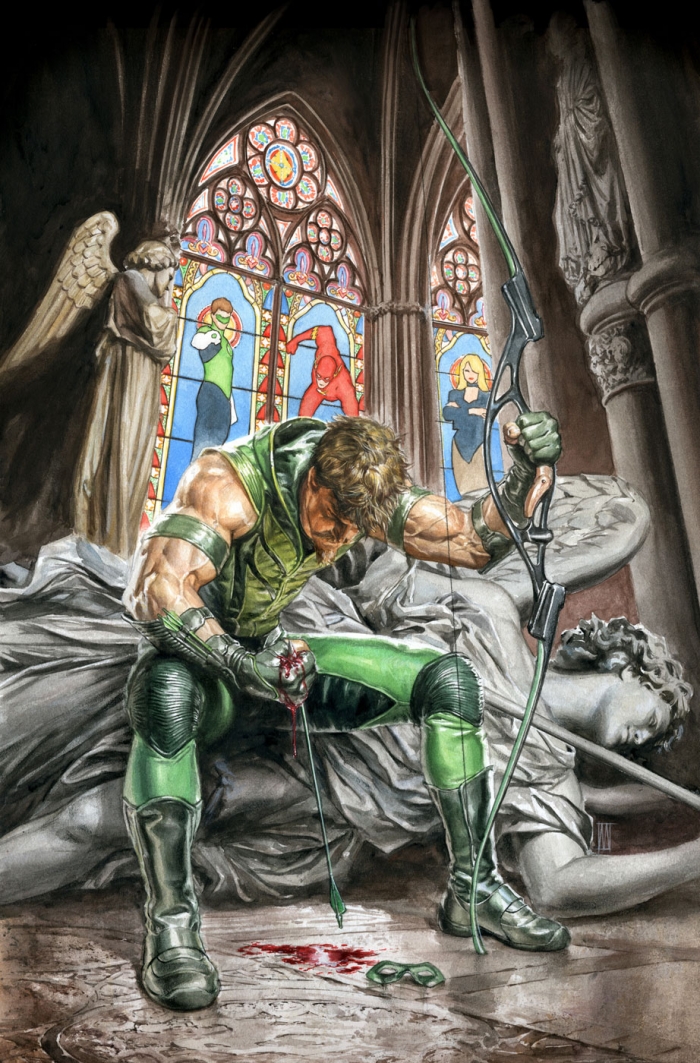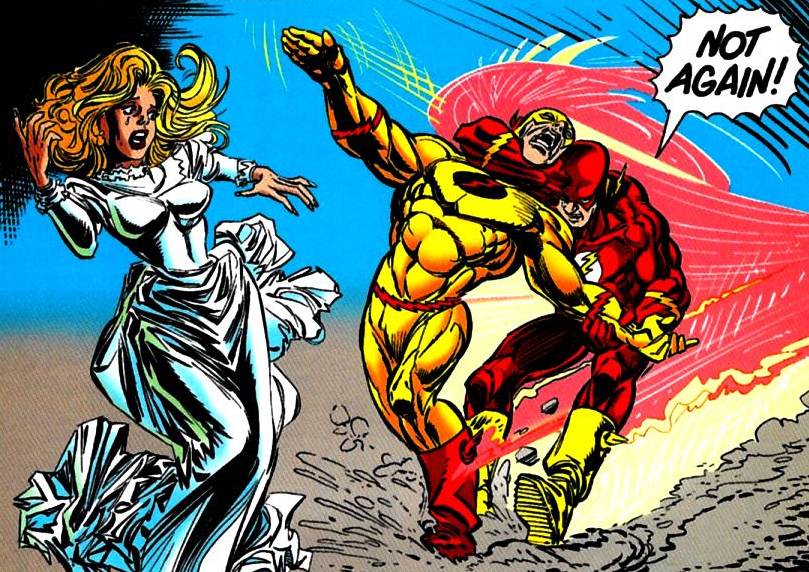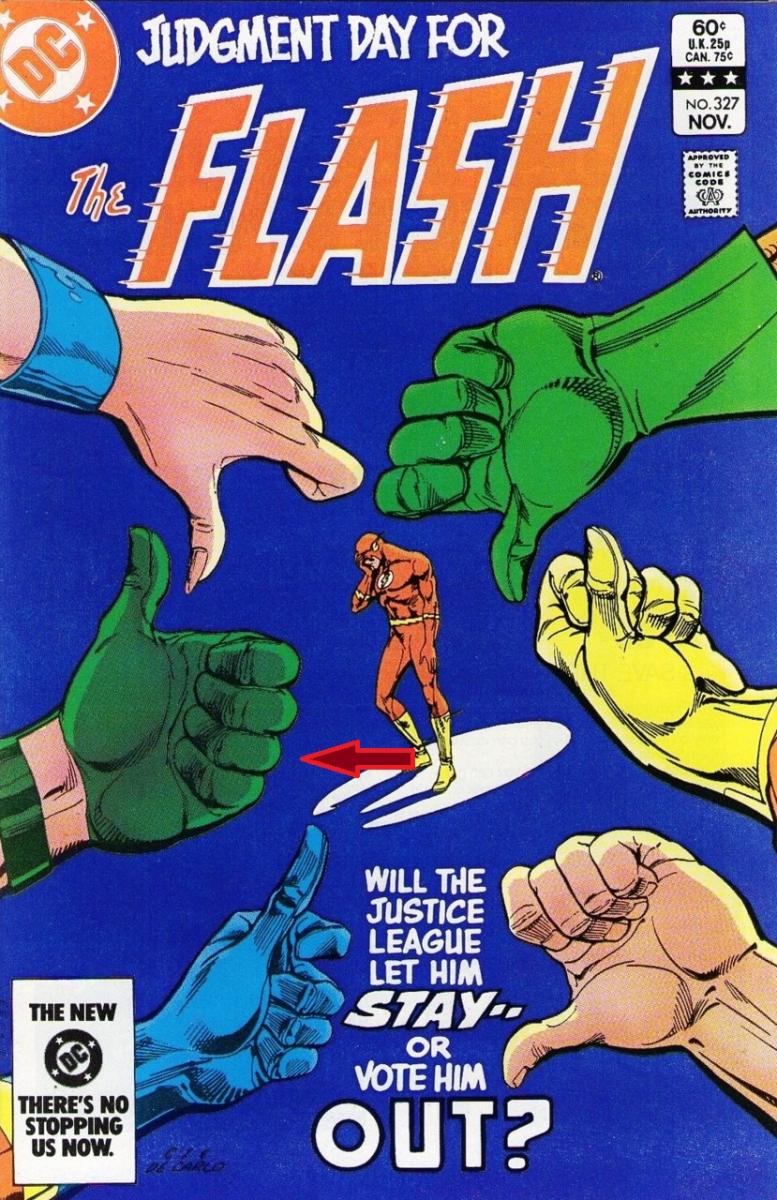The Fall of the Green Arrow (And Why Barry Allen is a Jerk)
FTC Statement: Reviewers are frequently provided by the publisher/production company with a copy of the material being reviewed.The opinions published are solely those of the respective reviewers and may not reflect the opinions of CriticalBlast.com or its management.
As an Amazon Associate, we earn from qualifying purchases. (This is a legal requirement, as apparently some sites advertise for Amazon for free. Yes, that's sarcasm.)

I initially thought I'd write this up as a review of DC Comics' Green Arrow #31. But the more I thought about it, I found I had too many other things to say, about the story, the events surrounding it, and the contradictions that abound within the DC unified universe.
Way back when, when DC Comics unified their titles and demonstrated that, yes, Batman and Superman (and thus all their other heroes) actually lived in the same shared setting and were not isolated from each other in storytelling islands, it opened up a new vista of potential adventures for writers to explore. These days, however, it also provides a panoply of rules and precedents that work against each other, with the whim of the current writer being the only deciding factor as to how a character may react, prior experiences notwithstanding.
The current story involving Oliver Queen, aka the Green Arrow, spins out of events of the miniseries, Justice League: Cry for Justice -- an event which occurs immediately prior to Blackest Night and leads into the current issues of Justice League of America as well as Green Arrow. What happened is this: Green Lantern, Green Arrow, and a handful of other heroes branch out from the proper organization of the Justice League to be more proactive, seeking out the bad guys before they have the chance to pull off whatever nefarious scheme they're planning. It's not the first time such a plot device has been used in DC, and it's never really been pulled off successfully, either because superheroes work their best as reactionary forces or because a writer hasn't been creative enough to pull it off for more than a short story arc.
As Cry for Justice progressed, the team ran into Prometheus, the bad guy equivalent of Batman when it comes to foresight -- indeed, the name Prometheus actually means "forethought." For the sake of expediency, I won't delve into all the details of the rather ill-written plot; it all leads up to cities being destroyed by a captured Prometheus, and the only way the heroes can stop the destruction is to release the villain.
Now this was, so far, a non-event in the rest of the DC Universe. A non-event, despite the fact that cities were falling, with over 90,000 casualties in Star City alone -- the home stomping grounds of Green Arrow. It's the kind of ignored catastrophe I've talked about before at length. It's too big of a death toll to be more than a blip on the DC radar.
But at least those deaths registered to Green Arrow -- if not because of the sheer quantity of them, then because the catastrophe also maimed his adopted son, Roy Harper (aka Red Arrow) and killed his granddaughter Lian. For years, Green Arrow has been the embodiment of "the angry liberal" -- contrasted nicely throughout the 70s and 80s against ultra-conservative fellow Justice Leaguer, Hawkman, as well as Green Arrow's close friend, Green Lantern -- a military man and intergalactic police officer. Despite his social justice stance, Green Arrow has never been above dispensing a good beating on drug dealers, kidnappers, bank robbers, and the like.
So after Prometheus was released, after the carnage stopped, and as Prometheus began to plan anew -- Green Arrow calmly steps out of the shadows and plants a shaft cleanly between the villain's eyes. Prometheus is dead.
Now, let's ask ourselves who is really surprised by this. I mean, take a look at the character himself. He's called the Green Arrow -- by definition he's shooting lethal, sharp things at you. Yes, for a long time he was miraculously firing non-aerodynamic missiles like boxing glove arrows or glue-bomb arrows -- all of which were tucked impossibly into a quiver of infinite holding. But when Mike Grell revamped the character in the 1980s with Green Arrow: The Longbow Hunters, he did away with that silliness and got down to basics, giving us a Green Arrow who would take down bad guys with piercing shots to the hands, thighs, and shoulders. By rights, Green Arrow should have more deadly assault charges filed against him than Batman.
So are we really that surprised that he finally killed somebody?
Apparently members of the Justice League are, and in Green Arrow #31, they send out three of their own to bring him in: his wife, Black Canary; his best friend, Green Lantern; and the newly resurrected from the dead Barry Allen, aka the Flash.
Two of these choices are unique. As Green Lantern, Hal Jordan was once possessed by the being known as Parallax. In his grief over losing his own Coast City to the events spinning out of the "Reign of the Supermen" in the mid-90s, the Parallax-possessed Hal went on a killing spree, wiping out most of the Green Lantern Corps and taking all their rings. But he got better and the Corps members were mostly brought back through means even this lifelong comics reader can't wrap his head around. But at least, perhaps because of this experience, Hal comes across as compassionate in his attempt to apprehend Green Arrow.
Barry Allen, on the other hand, comes across as a jerk.
Yes, I said that about "Saint Barry the Quick." And I'll say it again. He was a jerk.
To understand where I'm coming from, we have to go way, way back to the last days of Barry's own title, The Flash. It was the early 1980s, and the widowered Barry (at least he thought he was a widower, but we won't dig into that now) was preparing to meet his new bride-to-be, Fiona Webb, at the altar. But his arch-enemy, Professor Zoom, was determined to make Barry's life all the more miserable by killing his bride at super speed. Barry chased after Professor Zoom, caught up with him, and broke his neck before he could commit the deed.
 No accident. No possessions. No temporary insanity. And for a guy who thinks as fast as the Flash, there is no such thing as a crime of passion -- everything is premeditated. Flash killed Reverse Flash to save one life and avenge one life (Reverse Flash being the same one who was believed to have killed Flash's first wife, Iris Allen).
No accident. No possessions. No temporary insanity. And for a guy who thinks as fast as the Flash, there is no such thing as a crime of passion -- everything is premeditated. Flash killed Reverse Flash to save one life and avenge one life (Reverse Flash being the same one who was believed to have killed Flash's first wife, Iris Allen).
During this crisis in the Flash's life, he was brought before the members of the Justice League, where a vote was being conducted as to whether the Flash would be expelled from the team. It was three for and three against when Superman arrived late to cast the tiebreaker vote which allowed Flash to remain a member on a probationary basis. Superman's vote was added to the other three votes for keeping Flash as a member -- those votes having been cast by Firestorm, Flash's buddy Elongated Man, and... Green Arrow.
Yes, Flash had just killed a man, with perhaps just cause, and Green Arrow voted that he had done the right thing.
So what does Barry have to say to Green Arrow when they meet up in this particular issue?
"Every time I see you -- you remind me why I don't like you, Green Arrow. I'll never understand why Hal was ever friends with you."
The Superdickery people may have fun with their "Superman is a Dick" theme, but, clearly, Barry Allen is a jerk.
 By the way, Green Arrow avoids capture by these most powerful of Justice Leaguers. He does, after all, have his own story to be told, and it wouldn't go far if he were in custody. Because he's not satisfied with just having taken down Prometheus; Prometheus had help, at least in Star City, in the form of the Electrocutioner, a former Vigilante nemesis, who sparked (literally) the explosion that leveled the city.
By the way, Green Arrow avoids capture by these most powerful of Justice Leaguers. He does, after all, have his own story to be told, and it wouldn't go far if he were in custody. Because he's not satisfied with just having taken down Prometheus; Prometheus had help, at least in Star City, in the form of the Electrocutioner, a former Vigilante nemesis, who sparked (literally) the explosion that leveled the city.
Now, if the DC Universe operated on anything like a consistent basis, Green Arrow would have to do nothing; because God exists in the DCU, and He has an emissary on Earth to exact final justice: the Spectre. One would think that such an act of mass murder might, might, just tug a little on his shirtsleeve and get his attention. Alas, the Spectre seems to be able to pick-and-choose his battles, taking on only planet-killing entities or back-alley hit men. Middling destruction in the tens of thousands is too trivial a statistic for him to waste his time on. But I rant...
Cry for Justice has left a lot of fallout that will need cleaning up. Future solicitations already show Roy Harper being outfitted with a new arm (while the former Batgirl, now Oracle, is still confined to a wheelchair from a "simple" bullet to the spine). "The Fall of the Green Arrow" will arc through the archer's own title, Justice League of America, and some standalone specials, the ramifications of which will go largely unnoticed due to lackluster writing and artwork (at least in Justice League of America, and yes I'm including the James Robinson work in that reckoning), and the glare given off by the Blackest Night follow-up, Brightest Day.
Which is a shame. Because, to me, this is the kind of story that has far more potential for character development and moral ambiguity than whether or not a "back from the grave" Aquaman can defy the odds and finally have a series that people will buy and read for more than a year.


